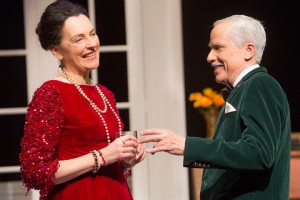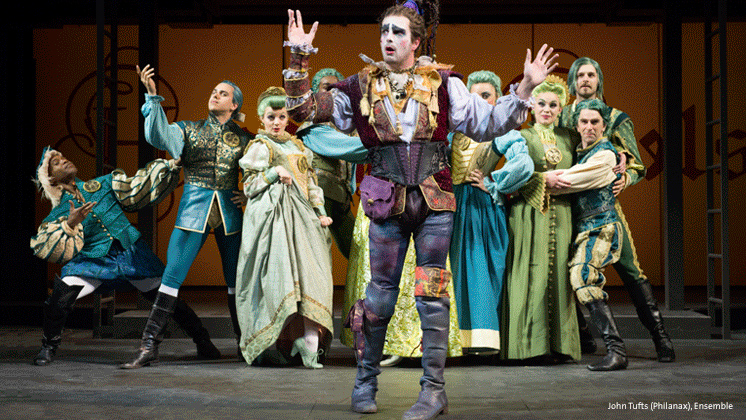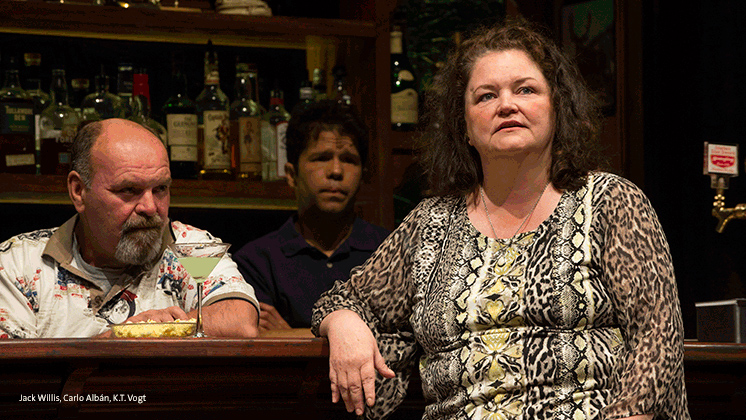UniSon
at the Oregon Shakespeare Festival
UniSon
A new musical by UNIVERSES
Inspired by August Wilson’s Poetry
In association with Constanza Romero
WORLD PREMIERE
UniSon is a brief, brilliant, shotgun wedding between poetry and drama, lubricated into position with just the right amount, and right style, of original music.
UNIVERSES and collaborators pulled off a transformation. Wilson’s original poetry, supplemented by UNIVERSES verses, are used as the dialogue in a coherent, sensible, sensitive narrative.
No longer just words, even vivid words, the views and observations in poems are given context and life by 7 Terrors from the dark parts of the mind of a fictional poet. The Poet, a doppelganger for August Wilson, is the focus of the play and its main character. Those Terrors reveal secret, unsanitized parts of the revered poet’s life.
The set and projections are strokes of genius. The stage is furnished cleanly allowing key elements of the action to grab as much attention as possible. Meanwhile, the multiple projection screens are the best use of that technology that I have seen. They are front-and-center, key to the movement of the story. Sometimes providing the written words of the poet, sometimes displaying appropriate icons, and sometimes providing simple elegance. Always spot on.
The play begins with the poetic words of August Wilson projected, and the dialogue opens with Steven Sapp (the Poet) artistically dispensing bombastic wisdom to Asia Mark (his Apprentice). He bludgeons his assistant with insight. A few pages of heavy Meaningful commentary go by before we wind up at the poet’s funeral and will reading. He bequeaths everything to the Apprentice on the condition that when she locates his trunk of private poems she destroy the contents.
Of course, she doesn’t destroy, but opens, the Poet’s box, unleashing the Terrors. This all happens within the first 10 minutes of the production, but the introduction felt a bit draggy. Maybe I was just worried that the entire 90 minutes was going to be as disconnected and lofty (tending toward pretension) as the first few scenes.
But, my fears of boredom were dispelled by the first spotlighted Terror, Terror #3, played by Kevin Kenerly. Physical energy, depth, emotion took over the stage as Kenerly revealed suppressed worries of the Poet, sounding perfect using the type of verses that had sounded too high minded and ethereal just a minute ago.
It turns out that Kenerly was just the first of 7 master class dialogues unleashed by each Terror in succession. The vignettes illuminate the torments hidden inside the Poet. Together they create a vivid view of a private man.
The acting could not have been better, nor could the work have been better designed. Each character had at least one spotlight moment that built — or revealed — an essential part of the Poet. Each actor made the most of what was written for them and added movement, voice, and feeling. Sapp, Mark, Kenerly were completely right. So were Christiana Clark (Terror #1/Seamstress), William Ruiz (Terror #2/Butcher), Rodney Gardiner (Terror #4/Black Smith), Mildred Ruiz-Sapp (Terror #5/Hunter), Yvette Monique Clark (Terror #6:/Momma), and Jonathan Luke Stevens (Terror #7/Soldier).
Each character, each actor, had seriously impressive scenes. Together the scenes built a seriously impressive story.
And, you keep wondering. How much are the poems, the dialogue, the fears really August Wilson on August Wilson? How close is the whole story to his life? How much of the material did Constanza Romero, Wilson’s widow, provide from Wilson’s own trunk and give to this production? How could she let the verses go public and not destroy the poems, if Wilson’s will mandated that destruction? Thank God she didn’t.
I enthusiastically recommend UniSon as a play, a performance, as poetry, as art. I’d also change a few things. The initial scenes setting up the opening of the Terror trunk are too long and self-important. The audience can get the idea sooner, and the Poet’s stabs of pain foretelling his imminent death are unneeded, or at least weirdly executed.
Then at the will reading we were told that the Apprentice was given the estate on the condition that she burned the contents of the trunk. She didn’t. Nothing happened. The Poet didn’t say anything releasing her from that bond, and the estate didn’t go away. So, I felt like you showed me a gun in Act I and never fired it.
Finally, I am very pleased that the actual performance did not convey the situation described in the Playbill: “… the Apprentice opens the trunk, accidently pulling the Poet from the afterlife.” Nothing in what I saw made the trunk opening a cosmic bar to the afterlife or anything. I am glad I didn’t have to worry about getting the Poet to heaven or hell and could just learn about his life. Please, creative team, do not pick up the tired storyline in a rewrite!
UniSon is a thrill, a triumph, a collaborative win. Even with its few rough edges it rates ![]() .
.




